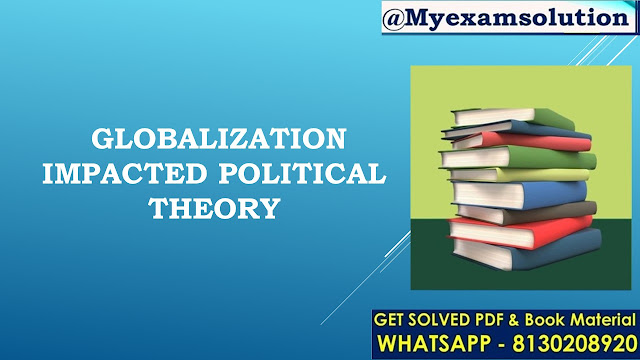How has globalization impacted political theory
Globalization is the process of the increasing interconnectedness of economies, societies, and cultures across the world. It has been a major force in shaping political, economic, and social systems around the globe.
Political theory, which seeks to understand and
explain the nature of political systems, has been greatly impacted by
globalization. This essay will examine the ways in which globalization has
impacted political theory.
One of the key challenges posed by
globalization to political theory is the erosion of national sovereignty. As
economic and political forces become more global, states are no longer able to
control their own economic and political systems. The rise of multinational
corporations and international organizations has led to a loss of control over
economic policy, while the growth of international human rights norms has
limited the ability of states to govern their own populations. This has led to
a debate within political theory about the role of the state in a globalized
world.
How has globalization impacted political theory:-Some scholars argue that the state
has become less important in a globalized world. They point to the growing
power of multinational corporations and international organizations, which are
able to operate across national borders with relative ease. These actors are
not bound by the same legal and political constraints as states, and are
therefore able to exert significant influence over national governments. This
has led to a decline in the power of the state, and a corresponding increase in
the power of non-state actors.
Other scholars argue that the state
remains the primary actor in international politics, and that it has simply
adapted to new challenges posed by globalization. They point to the fact that
states continue to be the primary source of authority in the international
system, and that they have developed new strategies for dealing with the
challenges of globalization. For example, many states have formed regional
blocs, such as the European Union, in order to better compete in the global
economy.
How has globalization impacted political theory:-Another area of political theory
impacted by globalization is democracy. Globalization has created new
challenges for democratic governance, particularly in the areas of
accountability and representation. As economic and political forces become more
global, it becomes more difficult for citizens to hold their governments
accountable. This is because decisions that affect citizens are increasingly
being made at the global level, where citizens have little or no say.
Similarly, the rise of global economic and political forces has led to a
decline in the ability of national governments to represent the interests of
their citizens.
Some scholars argue that
globalization poses a threat to democracy. They point to the fact that the
increasing power of multinational corporations and international organizations
has led to a decline in the ability of citizens to hold their governments
accountable. This has led to a decline in trust in government and a
corresponding increase in populism and nationalism. These trends have been
particularly pronounced in Western democracies, where citizens have become
increasingly disillusioned with traditional political parties and institutions.
How has globalization impacted political theory:-Other scholars argue that
globalization does not necessarily pose a threat to democracy, but rather that
it creates new challenges for democratic governance. They point to the fact
that globalization has led to the rise of new forms of participation and
activism, such as social media and online advocacy groups. These new forms of
participation have the potential to enhance democratic governance by allowing
citizens to engage more directly with their governments and with each other.
Conclusion
Globalization has had a profound
impact on political theory. It has challenged traditional notions of
sovereignty and territoriality, and created new challenges for democratic
governance and the role of the state in a globalized world. While some scholars
argue that globalization poses a threat to democracy and the power of the state,
others argue that it creates new opportunities for participation and activism.
As globalization continues to shape the political, economic, and social systems
of the world, it will undoubtedly continue to be a central focus of political
theory. It is important for political theorists to continue to engage with the
challenges and opportunities presented by globalization, and to work towards
creating new models of governance that can effectively address the complexities
of a globalized world.
Globalization impacted Political Theory FAQ.
Q: What is globalization?
A: Globalization is the process of
increasing interconnectedness of economies, societies, and cultures across the
world.
Q: How has globalization impacted political theory?
A: Globalization has impacted
political theory in various ways, including challenging traditional notions of
sovereignty and territoriality, creating new challenges for democratic
governance and the role of the state in a globalized world, and creating new
opportunities for participation and activism.
Q: What are some of the challenges posed by globalization to
political theory?
A: Some of the challenges posed by
globalization to political theory include the erosion of national sovereignty,
the rise of non-state actors such as multinational corporations and
international organizations, and the difficulties in ensuring accountability
and representation in a globalized world.
Q: What are some of the opportunities presented by
globalization to political theory?
A: Some of the opportunities presented by globalization to political theory include the rise of new forms of participation and activism, such as social media and online advocacy groups, and the potential for increased cooperation and collaboration between nations and regions.







0 comments:
Note: Only a member of this blog may post a comment.